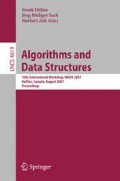Abstract
We study the straggler identification problem, in which an algorithm must determine the identities of the remaining members of a set after it has had a large number of insertion and deletion operations performed on it, and now has relatively few remaining members.
Access this chapter
Tax calculation will be finalised at checkout
Purchases are for personal use only
Preview
Unable to display preview. Download preview PDF.
References
Bloom, B.H.: Space/time trade-offs in hash coding with allowable errors. Commun. ACM 13, 422–426 (1970)
Bollobás, B.: Random Graphs. Academic Press, New York (1985)
Bonomi, F., Mitzenmacher, M., Panigrahy, R., Singh, S., Varghese, G.: An improved construction for counting Bloom filters. In: Azar, Y., Erlebach, T. (eds.) ESA 2006. LNCS, vol. 4168, pp. 684–695. Springer, Heidelberg (2006)
Bose, P., Guo, H., Kranakis, E., Maheshwari, A., Morin, P., Morrison, J., Smid, M., Tang, Y.: On the false-positive rate of Bloom filters. Report, School of Comp. Sci. Carleton Univ. (2007), http://cg.scs.carleton.ca/~morin/publications/ds/bloom-submitted.pdf
Broder, A., Mitzenmacher, M.: Network applications of Bloom filters: A survey. Internet Mathematics 1(4), 485–509 (2005)
Capetanakis, J.I.: Tree algorithms for packet broadcast channels. IEEE Trans. Inf. Theory IT-25(5), 505–515 (1979)
Colbourn, Dinitz, Stinson: Applications of combinatorial designs to communications, cryptography, and networking. In: Walker (ed.) Surveys in Combinatorics. London Mathematical Society Lecture Note Series, vol. 187, Cambridge University Press, Cambridge (1999)
Cormode, G., Muthukrishnan, S.: What’s hot and what’s not: tracking most frequent items dynamically. ACM Trans. Database Syst. 30(1), 249–278 (2005)
Cox, D., Little, J., O’Shea, D.: Ideals, Varieties, and Algorithms: An Introduction to Computational Algebraic Geometry and Commutative Algebra. Springer, Heidelberg (1992)
DeBonis, A., Gasieniec, L., Vaccaro, U.: Generalized framework for selectors with applications in optimal group testing. In: Baeten, J.C.M., Lenstra, J.K., Parrow, J., Woeginger, G.J. (eds.) ICALP 2003. LNCS, vol. 2719, pp. 81–96. Springer, Heidelberg (2003)
Du, D.-Z., Hwang, F.K.: Combinatorial Group Testing and Its Applications, 2nd edn. World Scientific, Singapore (2000)
Du, D.-Z., Hwang, F.K.: Pooling Designs and Nonadaptive Group Testing. World Scientific, Singapore (2006)
Eppstein, D., Goodrich, M.T., Hirschberg, D.S.: Improved combinatorial group testing for real-world problem sizes. In: Dehne, F., López-Ortiz, A., Sack, J.-R. (eds.) WADS 2005. LNCS, vol. 3608, Springer, Heidelberg (2005)
Fan, L., Cao, P., Almeida, J., Broder, A.Z.: Summary cache: a scalable wide-area web cache sharing protocol. IEEE/ACM Trans. Networking 8(3), 281–293 (2000)
Farach, M., Kannan, S., Knill, E., Muthukrishnan, S.: Group testing problems with sequences in experimental molecular biology. In: SEQUENCES, p. 357. IEEE Press, New York (1997)
Ganguly, S., Majumder, A.: Deterministic k-set structure. In: Proc. 25th ACM SIGMOD Symp. Principles of Database Systems, pp. 280–289 (2006)
Georgiadis, L., Papantoni-Kazakos, P.: A collision resolution protocol for random access channels with energy detectors. IEEE Trans. on Communications COM-30(11), 2413–2420 (1982)
Goodrich, M.T., Hirschberg, D.S.: Efficient parallel algorithms for dead sensor diagnosis and multiple access channels. In: SPAA. 18th ACM Symp. on Parallelism in Algorithms and Architectures, pp. 118–127. ACM Press, New York (2006)
Greenberg, A.G., Ladner, R.E.: Estimating the multiplicities of conflicts in multiple access channels. In: FOCS 1983. Proc. 24th Annual Symp. on Foundations of Computer Science, pp. 383–392. IEEE Computer Society Press, Los Alamitos (1983)
Greenberg, A.G., Winograd, S.: A lower bound on the time needed in the worst case to resolve conflicts deterministically in multiple access channels. J. ACM 32(3), 589–596 (1985)
Hofri, M.: Stack algorithms for collision-detecting channels and their analysis: A limited survey. In: Balakrishnan, A.V., Thoma, M. (eds.) Proc. Inf. Sem. Modelling and Performance Evaluation Methodology, Lecture Notes in Control and Info. Sci., vol. 60, pp. 71–85 (1984)
Hwang, F.K., Sós, V.T.: Non-adaptive hypergeometric group testing. Studia Scient. Math. Hungarica 22, 257–263 (1987)
Minsky, Y., Trachtenberg, A., Zippel, R.: Set reconciliation with nearly optimal communication complexity. IEEE Trans. Information Theory 49(9), 2213–2218 (2003)
Motwani, R., Raghavan, P.: Randomized Algorithms. Cambridge University Press, Cambridge (1995)
Pippenger, N.: Bounds on the performance of protocols for a multiple-access broadcast channel. IEEE Trans. on Information Theory IT-27(2), 145–151 (1981)
Ruszinkó, M., Vanroose, P.: A code construction approaching capacity 1 for random access with multiplicity feedback. Report, Fakultät für Mathematik der Universität Bielefeld, Report no. 94-025 (1994), http://www.math.uni-bielefeld.de/sfb343/preprints/abstracts/apr94025.ps.gz
Shoup, V.: A fast deterministic algorithm for factoring polynomials over finite fields of small characteristic. In: Proc. Int. Symp. Symbolic and Algebraic Computation, pp. 14–21. ACM Press, New York (1991)
Tsybakov, B.S.: Resolution of a conflict of known multiplicity. Problems of Information Transmission 16(2), 134–144 (1980)
Author information
Authors and Affiliations
Editor information
Rights and permissions
Copyright information
© 2007 Springer-Verlag Berlin Heidelberg
About this paper
Cite this paper
Eppstein, D., Goodrich, M.T. (2007). Space-Efficient Straggler Identification in Round-Trip Data Streams Via Newton’s Identities and Invertible Bloom Filters. In: Dehne, F., Sack, JR., Zeh, N. (eds) Algorithms and Data Structures. WADS 2007. Lecture Notes in Computer Science, vol 4619. Springer, Berlin, Heidelberg. https://doi.org/10.1007/978-3-540-73951-7_55
Download citation
DOI: https://doi.org/10.1007/978-3-540-73951-7_55
Publisher Name: Springer, Berlin, Heidelberg
Print ISBN: 978-3-540-73948-7
Online ISBN: 978-3-540-73951-7
eBook Packages: Computer ScienceComputer Science (R0)

